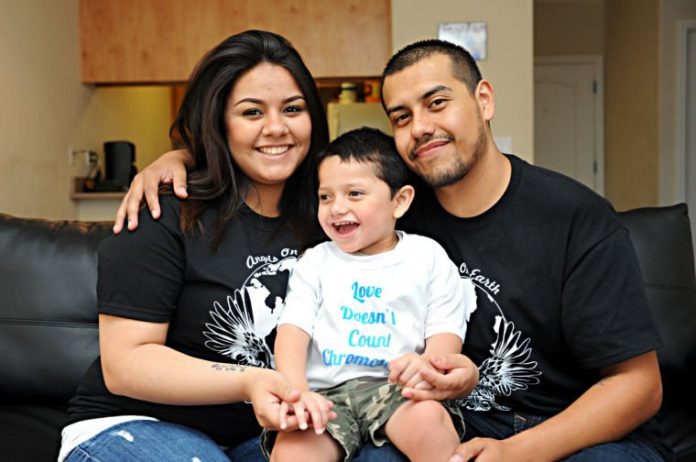
Gilroy youth Jayden Zaragoza won’t allow the symptoms of a seemingly rare disease get in the way of smiling.
Zaragoza, diagnosed with Angelman Syndrome in January of 2013, doesn’t let his developmental delay, lack of speech, seizures and walking and balance disorders get in the way of making his family proud or putting a smile on his face.
According to family members, little angels like Zaragoza require long life care. Characterized by an in-and-out of the hospital history, Zaragoza also suffers from a lung disease and does not speak yet.
Belying the smiles on the faces of those with Angelman Syndrome (AS), patients endure “a life marked by severe developmental delay, speech difficulties, seizure disorders and more,” according to researchers from Angelman Foundation, a national 501(c)(3) organization dedicated to supporting individuals with the syndrome, their families and others who care.
Almost 3 years old, the “trooper” with a “huge smile” can’t walk yet. He does know how to get up using the sofa or table as a brace, however, and has come a long way, family said.
Up to age 18-months, Jayden was unable to walk on his own. He moves around by sitting and kind of dragging inward his leg to move. He can only eat with his fingers since he is unable to use a spoon. He does not speak. He has a tendency to pull hair, which he enjoys because he is always overly excited and does not know that it is not polite.
For 20-year old parents Crystal and Oscar Zaragoza, the process can be a guessing game, as the child gets frustrated at times since he wants something and does not know how to ask for it.
He recently started having drop seizures, but they did not occur often and were very small—until March 29 when Jayden suffered a grand mal seizure that lasted 45 minutes.
Zaragoza isn’t alone.
According to the Angelman Syndrome Foundation, the prevalence of the syndrome among children and young adults hovers around one in 15,000.
Jayden was born at 36 weeks with a lung disease called MRSA that went undetected at Saint Louise Regional Hospital and Gardner Community Health Center, family said. Despite being born at 36 weeks, he was not kept any longer than a normal full-term delivery. Crystal, 20, remembered trying to tell doctors that her son sounded congested but being reassured it was normal by doctors. It wasn’t until he was rushed to Stanford Hospital at seven months that his undeveloped right lung was discovered, according to family. Two bronchoscopies later to remove liquid that accumulated, “we knew something was not okay with him since he would not sit or make any baby noises with his mouth,” grandmother Rocio Garcia said.
So the family asked the doctors but were not given a diagnostic, Garcia said. Zaragoza was tested for cystic fibrosis, which came back negative, and he was referred to physical therapy. The therapist suggested he might have Angelman Syndrome, and a test was called for.
“Which at Stanford was too expensive,” Garcia said.
Hernandez, a full-time stay-at-home mother, estimated the family was $30,000 in debt for medical bills. The constant 24-hour care she provides for her child and the appointments can be challenging. Her hope: to stop Jayden’s seizures and find a cure for Angelman’s syndrome. According to Hernandez, the recent onset of seizures has her worried, and “to me he’s still a normal little boy,” Hernandez said. “He’s in his terrible two’s right now.”
Not until Jayden was a member at Kaiser in 2012 within a doctor’s purview was the syndrome discovered, he said.
“(The doctor) saw him and showed a lot of interest and also immediately said that Jayden might have Angelman syndrome. Sure enough within two weeks he was diagnosed,” Garcia said.
Nowadays, Jayden’s physical therapies happen every Thursday. He is on Keppra twice a day to prevent seizures.
Crystal said she takes it “day by day.”
There’s hope in sight for the family and Zaragoza’s condition. According to the foundation, physical health in Angelman Syndrome into adult life appears to be remarkably good; however, problems from childhood like seizures may persist. A detailed analysis of the disease is available on the website.
“We never lose hope nor faith,” the family said on angelman.org. “We don’t worry what tomorrow will bring us—we just enjoy the moment. We will always look back on therapies, appointments, sleepless nights, tears, triumphs, milestones, equipment, ignorance, struggle, strengths and you say with certainty, it was absolutely worth it.”
Further, “We are so proud of him,” family said.
Jamel Thompson is an early interventionalist—or development specialist—who has worked with Jayden throughout the process. Thompson, mother Crystal and husband Oscar can agree that Jayden has his stubborn moments, but they’re not fazed.
“I’m trying to give him the best quality of life and to engage him in activities that will help him reach the highest potential,” Thompson said.
Challenges with Jayden?
“Getting him to sit down and focus on one activity,” Thompson said.
Thompson said she wants to emphasize Jayden’s support network of family members and that despite the parents’ young age, “Everyone has banded together.”
“He’s an awesome little boy with great potential,” Thompson said.
Walk for Angelman
Angelman Syndrome Foundation seeks to advance the awareness, understanding and treatment of AS, with the ultimate goal of finding a cure. Join the Zaragozas on May 17 for the 2014 Angelman syndrome National Walk held in Sacramento.
For more information, visit angelman.org.














